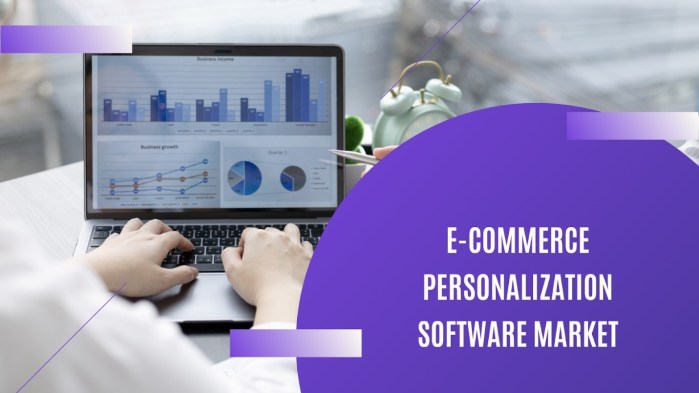E-Commerce Personalization Software Market Worth USD 2,412.3 Mn By 2033
Introduction
Based on data from Market.us, The Global E-Commerce Personalization Software Market is projected to expand significantly, reaching an estimated USD 2,412.3 million by 2033, up from USD 263.2 million in 2023. This growth represents a robust CAGR of 24.8% from 2024 to 2033. In 2023, North America was the leading region in this market, securing over 36% of the market share with revenues amounting to USD 97.7 million. This strong performance underscores the region’s pivotal role in advancing e-commerce personalization technologies.
E-commerce personalization software is designed to tailor online shopping experiences to individual user behaviors, preferences, and purchase histories. It employs data analytics and machine learning algorithms to provide customized product recommendations, dynamic content, and targeted marketing, enhancing user engagement and conversion rates. This technology is crucial for online retailers aiming to deliver relevant and enjoyable shopping experiences, leading to increased customer satisfaction and loyalty.
The e-commerce personalization software market is experiencing robust growth, fueled by increasing demand for personalized online shopping experiences. In 2023, the market’s valuation was substantial, with projections indicating a significant expansion by 2031. The market benefits from advancements in AI and machine learning, which enhance the software’s ability to deliver highly personalized content and recommendations.
Suggested Reading @ The Global E-commerce of Agricultural Products Market is set to experience substantial growth, with projections indicating a value of approximately USD 90.1 billion by 2033.
Several factors are propelling the growth of the e-Commerce personalization software market. Firstly, the explosion of online data and advanced analytics enables more precise customer insights. Secondly, the growing emphasis on enhancing customer experience as a differentiator in the crowded e-commerce space encourages businesses to invest in personalization. Additionally, the increasing consumer expectation for personalized shopping experiences across multiple channels is pushing retailers to adopt sophisticated personalization strategies.
The e-commerce personalization software market is ripe with opportunities as it aligns with current retail trends and technological advancements. The surge in omnichannel retailing necessitates personalization solutions that can integrate seamlessly across various consumer touchpoints, from online platforms to physical stores, enhancing the overall customer experience. This integration supports a consistent and personalized customer journey, regardless of the channel.
Emerging markets offer new growth prospects as increasing internet penetration and digital literacy expand the consumer base engaging in online shopping. Furthermore, the continuous advancements in technology, such as the integration of AR and VR with e-commerce platforms, present innovative ways to enrich the personalized shopping experience, thereby driving further adoption of personalization software. These advancements facilitate highly immersive and interactive shopping environments, tailored to individual preferences, setting the stage for the next evolution in e-commerce.
Key takeaways revealed that, In 2023, the Cloud-Based segment led the e-commerce personalization software market, securing over 65% of the market share. This preference highlights the scalability and accessibility cloud solutions offer. Although smaller in comparison, the On-Premise segment maintained its relevance, underscoring the need for localized control and data security among certain businesses.
The Large Enterprises segment dominated the e-commerce personalization software market, accounting for more than 58% of the market share in 2023. This indicates a strong adoption rate among larger organizations that have extensive customer bases to manage. Meanwhile, the Small and Medium Enterprises (SMEs) segment demonstrated significant growth potential, signaling an increasing recognition of personalized marketing’s value across business sizes.
In the industry-specific analysis, the Fashion and Apparel sector led with more than 37% of the market share, marking its prominence within the e-commerce personalization software market. Sectors such as Retail and Electronics also held substantial shares, reflecting their crucial roles in leveraging personalization technologies to enhance customer experiences.
North America e-Commerce Personalization Software Market Size
In 2023, North America held a dominant market position in the E-Commerce Personalization Software Market, capturing more than a 36% share with revenues amounting to USD 97.7 million. This leadership can be attributed to several key factors. First, the region has a highly developed digital infrastructure, facilitating widespread adoption of e-commerce solutions across retail sectors. Additionally, North American consumers show a strong preference for personalized shopping experiences, driving e-commerce platforms to invest heavily in personalization technologies to boost customer satisfaction and retention.
Furthermore, the presence of major market players in the U.S. and Canada, who continuously innovate and push the boundaries of personalized shopping through AI and machine learning technologies, significantly contributes to the market’s growth.
Read also – AI In Ecommerce Market size is expected to be worth around USD 50.98 Billion by 2033.
Emerging Trends
- AI-Driven Hyper-Personalization: E-commerce is increasingly harnessing AI to offer hyper-personalized shopping experiences. This trend sees AI analyzing vast amounts of data to tailor product recommendations and promotions specifically to individual user behaviors and preferences.
- Privacy-First Personalization: With growing concerns over data privacy, e-commerce platforms are shifting towards using first-party data to customize user experiences without compromising privacy. This approach builds trust and meets the stricter data protection regulations expected to shape future marketing practices.
- Dynamic Content: Content that adapts in real-time to user interactions on e-commerce platforms is becoming crucial. This includes personalizing emails and web pages based on user behaviors, such as past purchases or browsing history, to enhance engagement and conversion rates.
- Omnichannel Personalization: Offering a seamless personalized experience across all channels, including mobile, web, and in-store, is key. This strategy ensures that customers receive a consistent level of service and personalization, regardless of how or where they interact with the brand.
- Anonymous Visitor Personalization: Tailoring experiences for users who do not log in or provide contact information is gaining traction. By analyzing browsing behaviors, e-commerce sites can offer personalized content and product recommendations to anonymous visitors, which can help convert them into registered users and customers.
Top Use Cases
- Product Recommendations: Utilizing AI to analyze customer data and provide personalized product suggestions that cater to individual tastes and shopping habits is becoming a standard practice for boosting e-commerce sales and customer satisfaction.
- Predictive Analytics: This technology forecasts customer behaviors and preferences, allowing e-commerce businesses to anticipate needs and effectively target marketing efforts. It helps in optimizing inventory and improving the timing of promotions.
- Personalized Email Campaigns: By segmenting email lists based on user data like past purchases and site interactions, businesses can deliver highly relevant emails to customers. This strategy increases engagement and drives sales through targeted offers and content.
- Chatbot Interactions: Advanced AI chatbots can interact with customers in a more personalized way, providing support and product recommendations based on the context of previous interactions and known customer preferences.
- Dynamic Pricing: AI algorithms enable dynamic pricing strategies where prices are adjusted in real-time based on customer behavior, market demand, and competitor pricing. This approach helps maximize profit margins while remaining competitive in the market.
Major Challenges
- Adaptation Costs: Implementing AI-driven personalization solutions often requires significant investment in both technology and training. Customizing solutions to fit specific needs or integrating these tools into existing systems can escalate costs.
- Technological Pace: The rapid pace of technological advancement in e-commerce personalization software necessitates continuous updates and learning, placing a strain on resources as companies strive to keep up.
- Algorithmic Bias: Relying on algorithms for personalization can lead to biases, potentially unfairly targeting or overlooking certain customer groups, which could damage brand reputation and customer trust.
- Economic Fluctuations: Volatility in market conditions and consumer spending can affect the effectiveness of personalization strategies, requiring businesses to remain flexible and responsive to changes.
- Privacy Concerns: With growing customer awareness about data privacy, companies need to find a balance between personalization and privacy, ensuring they comply with legal regulations while still providing tailored customer experiences.
Attractive Opportunities
- AI-driven Personalization: Advanced AI algorithms offer the potential to revolutionize e-commerce by enabling hyper-personalization, which enhances the accuracy of product recommendations and customer interactions.
- Enhanced ROI: AI capabilities in personalization software can significantly shorten the time to realize return on investment, making these technologies highly cost-effective over time.
- Omnichannel Experience: There’s a growing trend towards creating seamless customer experiences across all platforms, from web to mobile to physical stores, which can increase customer satisfaction and loyalty.
- Growing Data Utilization: The ability to collect and leverage zero-party data provided directly by consumers can enable more accurate and effective personalization, fostering a more direct relationship between brands and their customers.
- Increasing Consumer Expectations: As online shopping becomes more prevalent across all age groups, personalized experiences are becoming a baseline expectation, providing a ripe environment for businesses that can effectively cater to diverse consumer needs.
Source of Information – https://market.us/report/e-commerce-personalization-software-market/
Conclusion
In conclusion, the e-commerce personalization software market is dynamically expanding, fueled by the convergence of technological innovation and rising consumer expectations for tailored shopping experiences. As businesses continue to recognize the substantial impact of personalized engagements on customer satisfaction and sales, investment in these technologies is surging.
The future of e-commerce lies in leveraging AI and real-time analytics to create deeply individualized customer interactions across all digital platforms. This not only promises significant growth opportunities for providers of e-commerce personalization solutions but also offers a competitive edge to retailers ready to innovate and adapt in an increasingly digital marketplace.
Explore More Reports
- Predictive Maintenance Market: Transforming Maintenance with Smart Technologies
- Automotive Predictive Maintenance Market: Pioneering Efficiency and Reliability
- Generative AI in Media and Entertainment: Transforming Creativity and Innovation in the Digital Era





Leave a Reply